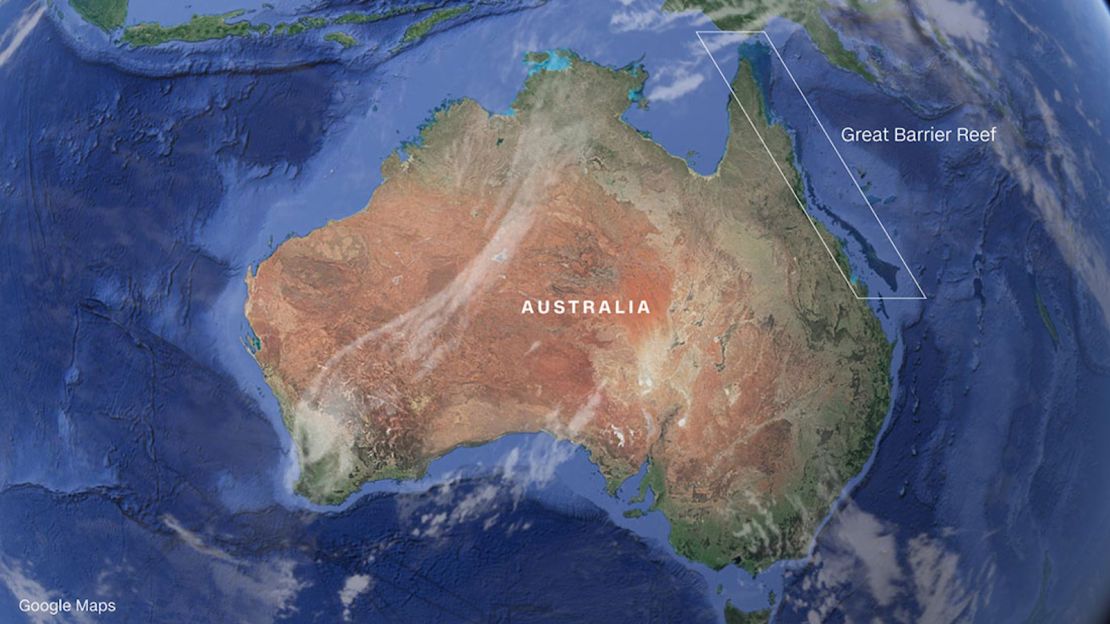Successive ocean heat waves are not only damaging Australia’s Great Barrier Reef, they are compromising its ability to recover, raising the risk of “widespread ecological collapse,” a new study has found.
The 2,300-kilometer-long (1,500 mile) reef has endured multiple large-scale “bleaching” events caused by above-average water temperatures in the last two decades, including back-to-back occurrences in 2016 and 2017.
The new study, released Wednesday in the journal Nature, examined the number of adult corals which survived these two events and how many new corals they created to replenish the reef in 2018.
The answer was as bleak as it was stark: “Dead corals don’t make babies,” the study’s lead author, Terry Hughes, said in a press release.
Scientists working on the study found the loss in adult corals caused a “crash in coral replenishment” on the reef, as heat stresses brought about by warming ocean temperatures impacted the ability of coral to heal.
“The number of new corals settling on the Great Barrier Reef declined by 89% following the unprecedented loss of adult corals from global warming in 2016 and 2017,” said Hughes.
Scientists have long warned of the impact on global warming on the reef, the world’s largest reef system and the only living organism that can be seen from space. The reef, a UNESCO World Heritage Site, supports thousands of species – fish, turtles, sharks and marine mammals.

In the introduction to the report, the authors note that environmental changes caused by climate change, “are increasingly challenging the capacity of ecosystems to absorb recurrent shocks and reassemble afterwards, escalating the risk of widespread ecological collapse of (the) current ecosystem.”
The study found that one of the most dominant species of coral, Acropora, which provides “most of the three-dimensional coral habitat that support thousands of other species,” according to co-author Andrew Baird, had suffered a 93% drop in replenishment following the back-to-back bleaching events of 2016 and 2017.
Australia's Great Barrier Reef suffers 'extreme' coral bleaching
Bleak future
Scientists working on the report say they would expect coral recruitment to recover over the next 5 to 10 years, as more corals reach sexual maturity, but only in the absence of another bleaching event. However, with sea temperatures continuing to rise this seems a near-impossiblity.
“It’s highly unlikely that we could escape a fifth or sixth event in the coming decade,” said co-author Morgan Pratchett.
“We used to think that the Great Barrier Reef was too big to fail – until now,” he said.
The recent bleachings follow two previous events, in 1998 and 2002. Scientists predict that the gaps in between bleaching events will only narrow as climate change worsens.
“Reef resilience is now severely compromised by global warming,” said Baird.
Previously, when one part of the Reef had been damaged, by, for example, a cyclone, other partswould seed the affected area with coral larvae, another co-author, Morgan Pratchett, noted.
“But now, the scale of severe damage from heat extremes in 2016 and 2017 was nearly 1,500 km (932 miles) – vastly larger than a cyclone track.”
He said that while areas of the Reef to the south which, due to cooler waters escaped the bleaching are still in good condition, they are too geographically distant to seed the affected parts further north.
“There’s only one way to fix this problem,” says Hughes, “and that’s to tackle the root cause of global heating by reducing net greenhouse gas emissions to zero as quickly as possible.”
Beginning of an ‘ecological collapse’
Between a quarter and a third of all marine species across the ocean have some part of their life cycle in coral reefs, John Veron, a renowned reef expert widely known as the “Godfather of Coral” told CNN in 2018.
“So, you take out coral reefs and a third to a quarter of all marine species gets wiped out. Now that is ecological chaos, it is ecological collapse … It’s the beginning of a planetary catastrophe,” said Veron.
The mass bleaching events in the past few years – and the prospect of losing one of nature’s greatest treasures – should be considered a wake-up call for the world in the wider battle against climate change, argued Veron.
“It’s more than an alarm bell,” said Veron. “It’s an air raid siren.”




































